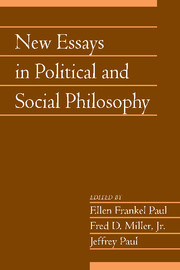Book contents
- Frontmatter
- Contents
- Introduction
- Acknowledgments
- Contributors
- Political Liberty: Who Needs It?
- State Coercion and Force
- Political Legitimacy and Economic Liberty
- Who Owns What? Some Reflections on the Foundation of Political Philosophy
- Human Reproductive Interests: Puzzles at the Periphery of the Property Paradigm
- Why Free Trade is Required by Justice
- Structural Exploitation
- Rescuing Justice from Equality
- Reinterpreting Rawls's The Law of Peoples
- Responsible Choices, Desert-Based Legal Institutions, and the Challenges of Contemporary Neuroscience
- Genocide and Crimes Against Humanity: Dispelling Some of the Conceptual Fog
- Harm and the Volenti Principle
- Education and the Modern State
- Index
Rescuing Justice from Equality
- Frontmatter
- Contents
- Introduction
- Acknowledgments
- Contributors
- Political Liberty: Who Needs It?
- State Coercion and Force
- Political Legitimacy and Economic Liberty
- Who Owns What? Some Reflections on the Foundation of Political Philosophy
- Human Reproductive Interests: Puzzles at the Periphery of the Property Paradigm
- Why Free Trade is Required by Justice
- Structural Exploitation
- Rescuing Justice from Equality
- Reinterpreting Rawls's The Law of Peoples
- Responsible Choices, Desert-Based Legal Institutions, and the Challenges of Contemporary Neuroscience
- Genocide and Crimes Against Humanity: Dispelling Some of the Conceptual Fog
- Harm and the Volenti Principle
- Education and the Modern State
- Index
Summary
This essay discusses Rawlsian justice in general and the difference principle in particular. It does so in the light of G. A. Cohen's masterful critique of Rawls in Rescuing Justice and Equality, a work that not only inspires the present paper, but also serves as a point of contrast for much within it. Like Cohen, I argue that the difference principle and the justifications given for it pull us in opposing directions. Specifically, I argue that Rawlsian arguments for the difference principle present a puzzle and that to respond adequately to the puzzle we must engage in rational reconstruction. To respond to the puzzle we must go beyond asking whether or not a proposed interpretation is one that Rawls himself would have endorsed, and start asking whether it is one that puts Rawlsian justice in its best light.
This much, I believe, is common ground between Cohen and myself. However, in stark contrast to Cohen, I present an interpretation—a rational reconstruction—of Rawlsian justice that shows it to be less intolerant of economic inequality than it is commonly taken to be. My aim, in short, is to rescue Rawlsian justice from its commitment to equality. A key motivation behind this reconstructive effort is the following simple thought.
- Type
- Chapter
- Information
- New Essays in Political and Social Philosophy , pp. 180 - 212Publisher: Cambridge University PressPrint publication year: 2013

